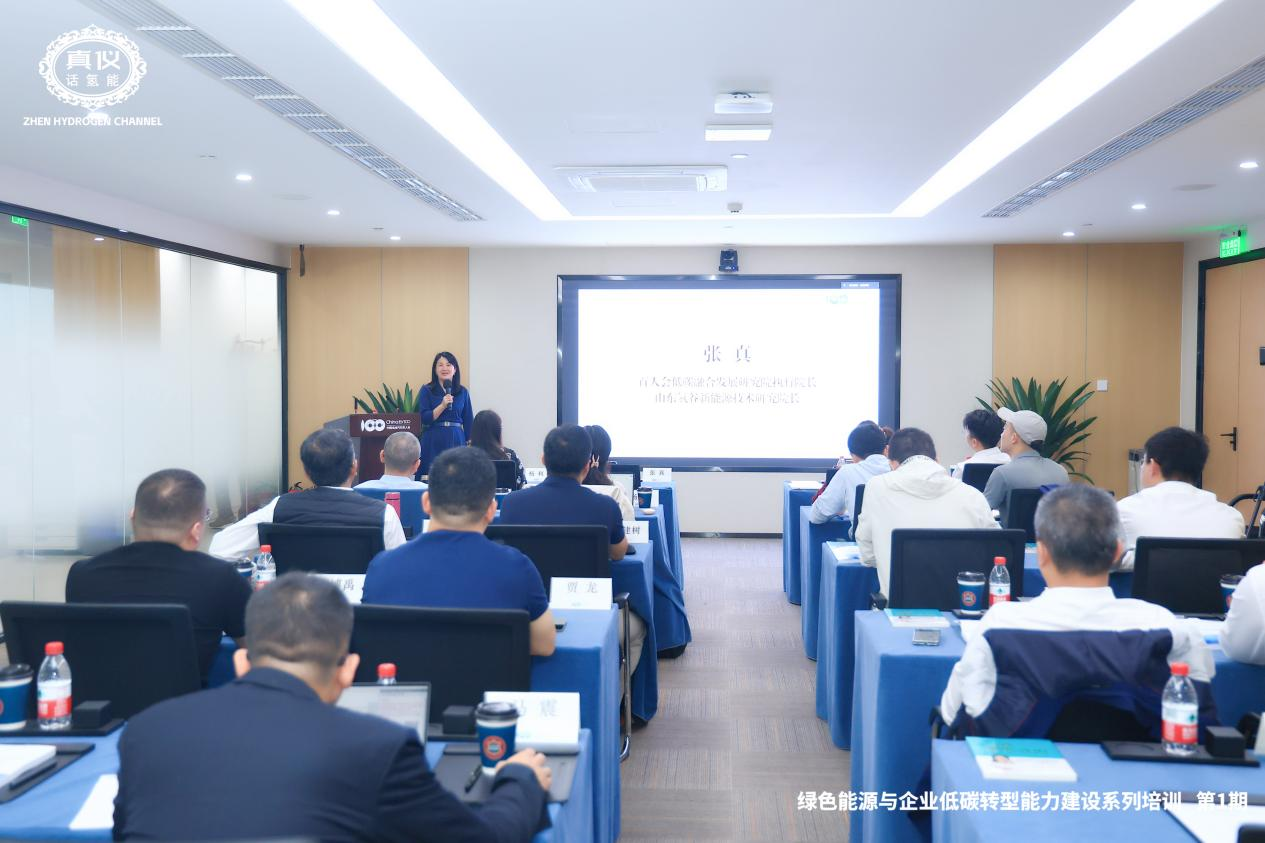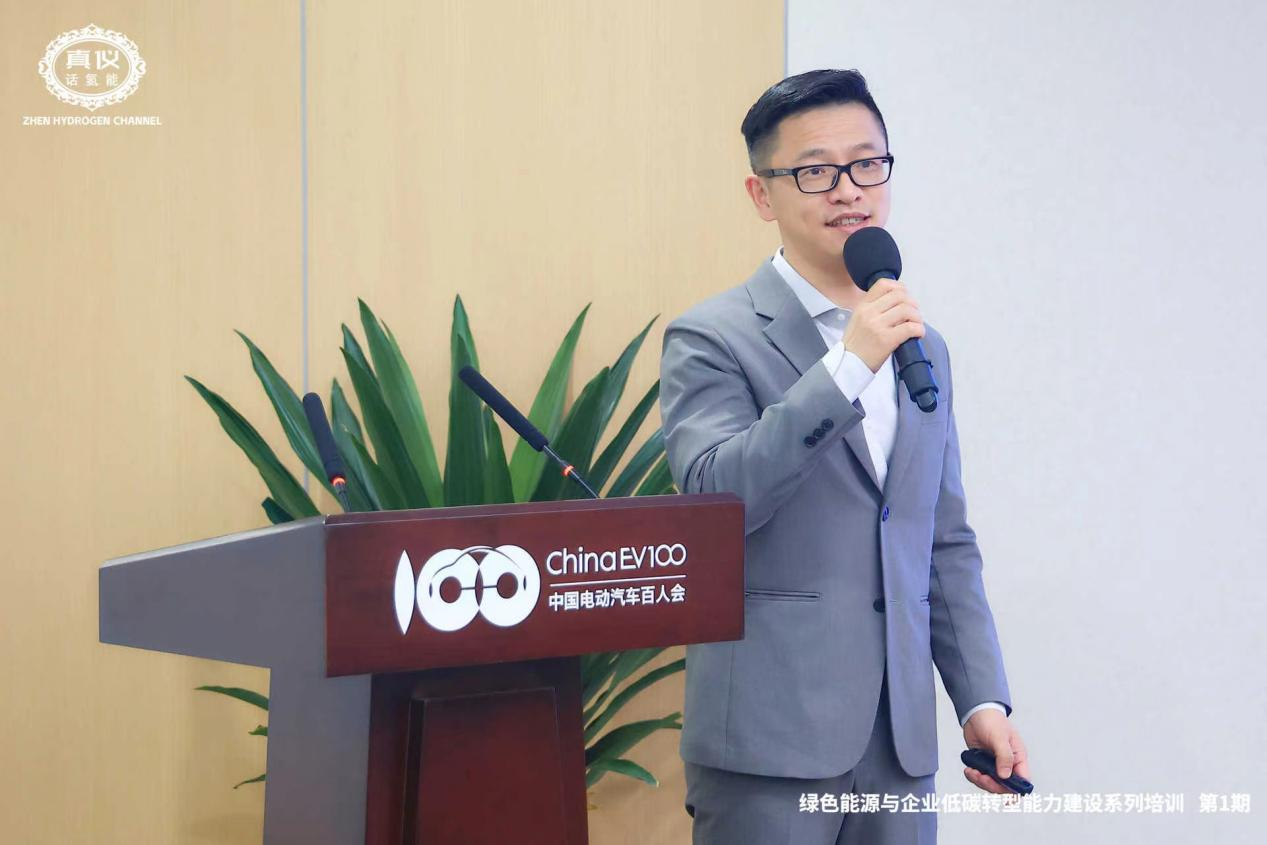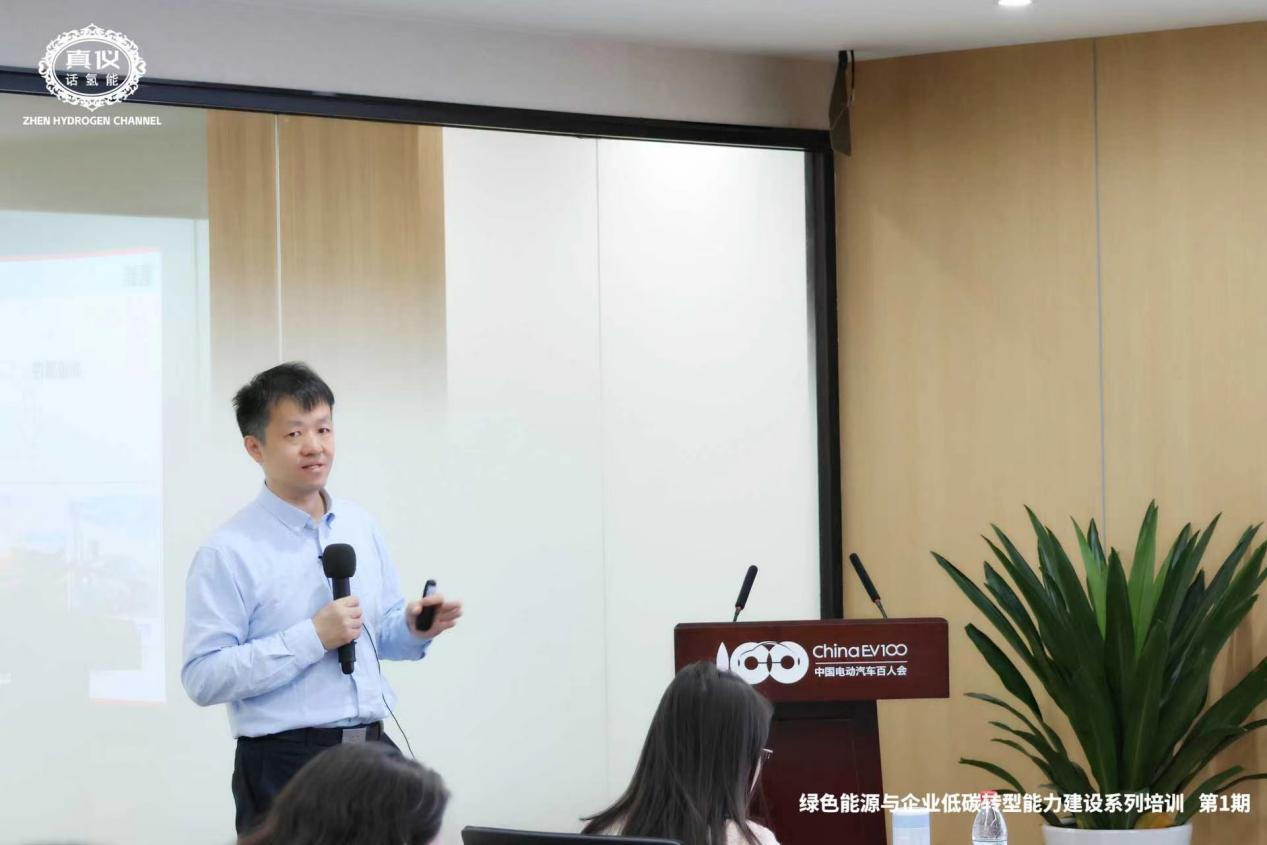On April 18-19, Shandong Hydrogen Industry New Energy Technology Research Institute successfully held the first session of the "Green Energy and Enterprise Low Carbon Transformation Capacity Building" series of training. There were over twenty senior management and senior technical personnel from more than ten companies such as Shanghai Qingkong Technology, Shenzhen Bairunsheng New Energy, Beijing Jijun New Energy, Yilite Automation, Zhongqing Yongsheng New Energy, Xi'an Chengshuofeng, Beijing Chuangzhilanhuanjing Technology, Chongqing Three Gorges Water Resources and Hydropower, Henan Fengnian New Energy attended the training and obtained the training completion certificate. The theme of this session was "Green Hydrogen Ammonia Alcohol Technology Route, Engineering Practice, and Market Opportunities," which included two parts: industrial training in the morning of April 18-19 and field research in the afternoon of April 19.

Group photo of all trainees
The industrial training on the mornings of April 18-19 featured lectures from 9 senior experts from institutions and companies including Shandong Hydrogen Industry New Energy Technology Research Institute, Shanghai Jiao Tong University, Central University of Finance and Economics, Shanghai Environment and Energy Exchange, Zhuangxin Wanfeng, and Sinopec Star Company.

Zhang Zhen, Executive Director of the China Electric Vehicle Hundred People Low Carbon Integration Development Research Institute and Director of Shandong Hydrogen Industry New Energy Technology Research Institute, gave two lectures on "Green Energy Map and Entry Opportunities" and "Certification and Investment Analysis of Green Fuels" during the training. The lecture on "Green Energy Map and Entry Opportunities" discussed how green hydrogen serves as a key driver for achieving the "dual carbon" goals and the importance of integrated development of power grid, load, and storage. It also highlighted the industrial opportunities faced under the driving force of market demand in various application scenarios, especially in the green methanol, green ammonia, and green aviation coal markets. The course on "Certification and Investment Analysis of Green Fuels" analyzed the EU ISCC certification system, introduced the process norms before green fuel certification, and examined the opportunities and challenges in the hydrogen energy industry from an investment perspective.

Liu Qian, Director of the Research Department of the Center for Sustainable Guidelines at the Central University of Finance and Economics, delivered a lecture on "Chinese Sustainable Disclosure Standards and the Application and Improvement of ESG Information Disclosure for Enterprises". The course analyzed market ESG rating methods and frameworks, ESG investment and financing situations, ESG corporate cases, and strategies for enhancing a company's ESG rating.

Nie Libin, Deputy Director of the Business Innovation Department at the Shanghai Environment and Energy Exchange, delivered a lecture on "Carbon Pricing and Corporate Carbon Management". The course explained the principles of carbon pricing, carbon emission quota allocation, the operating logic of carbon trading markets, and provided an overview of the national carbon trading market construction and voluntary emission reduction trading market development.

Senior expert in the electrolysis of water for hydrogen production, Ma Zhen, delivered a lecture titled "Introduction to Domestic and International Green Hydrogen Technologies and Project Development". The course covered various electrolysis technologies and development trends, including alkaline, anion exchange membrane, proton exchange membrane, high-temperature solid oxide, membrane-free electrolysis, coupling method, direct air electrolysis, and capillary electrolysis. Additionally, it discussed performance evaluation of electrolysis cells and material systems, and provided an overview of bidding and planning for domestic and international electrolysis projects for hydrogen production.

Xiong Guangyong, responsible for decarbonization solutions at JM China, gave a lecture on "Introduction to Green Fuel Technologies and Markets". The course covered the current market status and technological routes for traditional methanol, as well as the market and technological routes for green methanol. It also discussed sustainable aviation fuel technology solutions using biomass, urban solid waste, carbon dioxide, and green hydrogen, and provided examples of relevant classic cases.

Ding Chang, Deputy Manager of the Development Planning Department at Sinopec Star Company, delivered a lecture on "Construction Experience of a Thousand-Ton Green Hydrogen Project". The course covered Sinopec Star's experiences and innovative solutions in constructing large-scale, especially thousand-ton-level green hydrogen projects. It also discussed the challenges and issues encountered during the implementation and operation of the projects, and highlighted the achievements of the current thousand-ton green hydrogen projects.

Feng Yufeng, the Technical Director of the Green Chemical Team at China Chemical Donghua Technology, delivered a lecture on "Economic Analysis and Analysis of Difficult Points of Green Methanol Projects". The course covered the production routes of green methanol from biomass, electricity, and a combination of biogas and green hydrogen. It also shared the challenges and difficulties in the production of green methanol projects.

Professor Zou Jianxin, a distinguished professor and Ph.D. supervisor at the School of Materials Science and Engineering at Shanghai Jiao Tong University, as well as the Deputy Director of the Hydrogen Science Center, delivered a lecture on "Current Status and Challenges in Hydrogen Energy Storage and Transportation Technologies". The course covered the development status and challenges faced by hydrogen energy storage and transportation technologies, including gaseous hydrogen transport such as pipeline transport, cryogenic liquid hydrogen storage, hydrogen-rich liquid compound transportation, and solid-state hydrogen storage.

Associate Professor and Ph.D. Supervisor at Shanghai Jiao Tong University, as well as Honorary Research Fellow at Trinity College, University of Cambridge, Hu Zhigang, delivered a course on "Green Ammonia Hydrogen Storage and Transportation Technology with Engineering Case Studies." The course covered ammonia synthesis processes such as the Haber process, chemical looping synthesis, photochemical synthesis, and electrochemical synthesis. Various domestic and international green ammonia engineering case studies were analyzed, along with an examination of ammonia storage and transportation costs.
On the afternoon of the 19th, the training class organized a field research visit for the students to explore sites such as the Daxing International Hydrogen Energy Demonstration Zone, Haeboer Hydrogen Station, State Power Investment Corporation Hydrogen Technology, and the State Power Investment Corporation Beijing Hydrogen Pilot and Production Base.

Visiting the Daxing International Hydrogen Energy Demonstration Zone.
The first stop was a visit to the Daxing International Hydrogen Energy Demonstration Zone. This demonstration zone covers various aspects of hydrogen energy research, utilization, manufacturing, display, and exchange, aiming to promote technological innovation and commercial applications in the hydrogen energy industry. The Phase I project, spanning approximately 50,000 square meters, was completed and put into operation in 2021. It now features a hydrogen refueling station, an interactive exhibition center, a research and development incubator, and various supporting services within the demonstration zone. Currently, 136 hydrogen energy companies have established their presence there, leading to the initial formation of a hydrogen fuel cell industry cluster effect.

Haeboer Hydrogen Station.
The second stop was a visit to the Haeboer Hydrogen Station, located within the Daxing International Hydrogen Energy Demonstration Zone. Haeboer is the world's largest gaseous hydrogen refueling station, equipped with 8 hydrogen dispensers and 16 refueling nozzles. It has a daily hydrogen refueling capacity of up to 4.8 tons, serving a large number of fuel cell vehicles with hydrogen refueling services every day.

Visiting the State Power Investment Corporation Hydrogen Technology.

The State Power Investment Corporation Beijing Hydrogen Pilot and Production Base.
The third stop included visits to the State Power Investment Corporation Hydrogen Technology and the State Power Investment Corporation Beijing Hydrogen Pilot and Production Base. The construction of the State Power Investment Corporation Beijing Hydrogen Pilot and Production Base includes production workshops, hydrogen refueling stations, and is expected to become an important base for producing hydrogen fuel cells. Once operational, it is anticipated to achieve the goal of producing 3,000 sets of hydrogen fuel cells per year.
After two days of industry training and field research, the first phase of the "Green Energy and Enterprise Low-carbon Transformation Capacity Building" training series concluded successfully. All participants have completed the training and obtained relevant certificates of completion.

